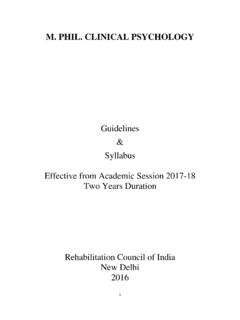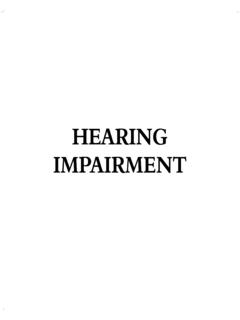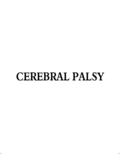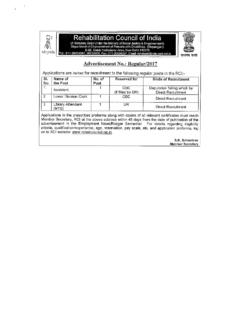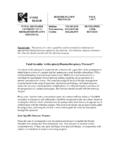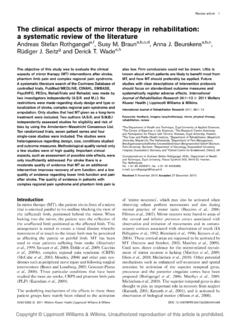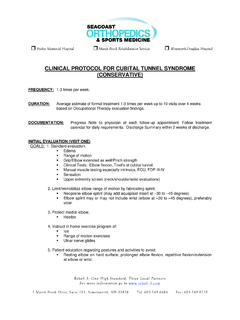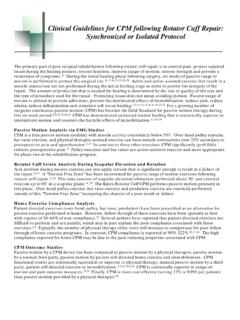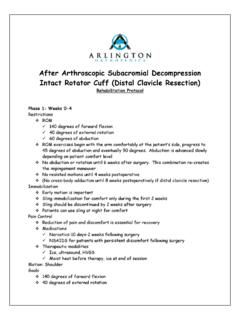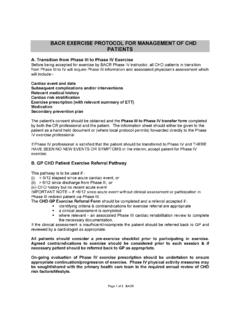Transcription of M. PHIL. CLINICAL PSYCHOLOGY - Rehabilitation Council of …
1 1 M. phil . CLINICAL PSYCHOLOGY Guidelines & Syllabus Effective from Academic Session 2017-18 Two Years Duration Rehabilitation Council of India New Delhi 2016 2 Preface Since its inception, the Rehabilitation Council of India, consistent with the mandate given, is facilitating and providing needed support for the development of various categories of professionals notified in the area of disability and Rehabilitation . One of the important professional categories is CLINICAL psychologist in which responding to social and professional concerns, the Council has taken several new initiatives to streamline the professional practice at different levels; as well to develop human resource availability for implementing several societal welfare programs launched and adapted by the State and Central bodies, within NMHP framework.
2 Presently, more than 25 centers are recognized by the Council and over 300 professionals are being trained annually. Although training centers located at varied patient-care settings have been recognized, the Council ensures recommendations made in the curriculum of M. phil program are regarded as prescriptive norms at implementation level and CLINICAL training is aligned with overall professional goal, and education is integrated with academic objectives at all training institutes. The Council assesses the effectiveness of various training components through multisource feedback and uses these results for improvement. The present revised regulations and curriculum illustrates such an effort. The revision committee that constituted subject experts from Public and Private sectors, and Council s internal resources has deliberated discreetly on all aspects of the curriculum without bargaining for reality.
3 The Council is confident that this revised curriculum, thought to be consistent with current professional knowledge and universal praxis by scholars, professors and heads of department, and coordinators of the program, would be found valuable by all concerned in furthering professional objectives and enhancing the likelihood of desired outcomes. For today, the Council is of the opinion that initiating Quality Improvement Program is better left to the training centers. Therefore, the responsibility of developing and implementing an appropriate quality assessment process and outcome targets that the centers aspire to change, rests on those put in charge of the centers. Level of care provided and quality, provider performance and ways of improving, treatment protocol and outcome or efficiency are a few of the prioritized quality measures that centers are required to consider while designing a continuous evaluation mechanism that should be based on convenience, cost and stakeholders acceptance.
4 The Council is pleased to forward this revised M. phil CLINICAL PSYCHOLOGY Guidelines and Syllabus to Registrars of Universities, Deans of concerned faculty, Heads of Departments and other stakeholders with request for an early action to implement the new syllabus academic year 2017. The Council takes this opportunity to thank all those contributed directly or indirectly to human resource development in the area of Rehabilitation , and look forward to their continued active participation. 3 M. phil . in CLINICAL PSYCHOLOGY INTRODUCTION CLINICAL PSYCHOLOGY as one of the core disciplines in the area of mental health/illness has grown significantly in the last two decades. Today, the CLINICAL PSYCHOLOGY training is being offered at more than ten recognized centers across the country with utmost efficiency.
5 Consequently, the number of CLINICAL psychologists available in service sectors has increased significantly. Though there is an upward trend, number of professionals currently available at various levels is no match to the number specified to face the ever growing demands in the field. Mental health problems are continuously on the rise owing to change in life style, habits and mounting stress in personal/occupational/social domains across various sections of the society. CLINICAL Psychologists apply knowledge and methods from all substantive fields of biopsychosocial sciences for promotion and maintenance of mental health of individuals. Varieties of techniques and methods derived from several branches of PSYCHOLOGY are used in promotion of mental health, and in prevention, diagnosis, treatment and Rehabilitation of mental and physical disorders/ problems where psychological factors play a major role.
6 Different methods and forms of psychological techniques are used to relieve an individual's emotional distress or any other forms of dysfunction or disability. Thus, CLINICAL Psychologists play an important role for optimizing health care delivery system and there is an urgent need to train more number of professional CLINICAL psychologists. The Council is committed to give the needed impetus to human resource development in the field of CLINICAL PSYCHOLOGY and work towards establishing more centers for training in CLINICAL PSYCHOLOGY in the coming years. Also, efforts will be made to ameliorate unequal distribution and underutilization of human resource poll created, and to equip our professionals with the latest developments in the field through CRE programs, so that they deliver patient-centered services effectively and competently.
7 In the recent time a trend is observed for training in CLINICAL PSYCHOLOGY to be shifted from traditional mental hospital-based programs to programs operated by medical colleges and NGOs. Consequently, there has been a steady progress in reducing manpower shortages in addition to witnessing the practice and research in CLINICAL PSYCHOLOGY growing in several directions. Though, the feedback received from the participants of these training programs is encouraging, it is our endeavor to keep pace with changing times and make available most up to date information for trainees in various settings. The Council hopes that the following revised guidelines would help centers already conducting M. phil . program to provide a cohesive and meaningful training so that the trainees develop to their fullest potential and shall be able to discharge their responsibilities competently as clinicians, teachers/trainers, researchers and administrators in the field of mental health.
8 This document is also meant to serve as guidelines for institutions intending to start the training program in CLINICAL PSYCHOLOGY to strengthen their resource base in terms of infrastructure and personnel for providing an effective training in the field of CLINICAL PSYCHOLOGY . 4 The syllabus is specified in terms of learn to and learn about and is sequenced developmentally to form a continuum of learning. The teachers need to be aware of this feature and impart training in succession for progressive development of skills, knowledge and understanding in a range of techniques, theories, approaches and methods. This model will allow all trainees to develop a range of skills and knowledge essential to and underpinning all other learning in specialized areas. Depending on the available resources and expertise at the center, the appropriate academic formats in content area of each paper can be worked out.
9 Though a standardized structure is adopted across different papers, sufficient flexibility is maintained for centers to respond to needs, interests and abilities of the trainees, and the resources available. The practical and CLINICAL work should be used as an organizer to integrate all learning across the subjects, while learning being used at varying stages to integrate and apply knowledge and skills developed. The current syllabus will accommodate the incorporation of any new and emerging practices/trends into the content areas as practice change. Therefore, inclusion of additional study, emerging concepts/practices etc. into the training program so that the training reflects current practices and trends, is the sole responsibility of the centers. If such additional input requires the trainees to be posted at the suitable environment for example, school, community, institution etc.
10 The centers can act at its discretion (refer ), as long as it reflects national and international practices, and do not compromise the learning activities in core model. Teachers require opportunities to build upon previously acquired knowledge and skills to ensure currency of delivery in the classroom and clinics. The centers should therefore make enough provisions for the teachers to upgrade their knowledge/skills as often as it required. Dissertation projects could be flexible or specialized to suit the center needs and priorities. However, the topic of study should reflect contemporary developments and practices, and the trainees would have had an opportunity to use a range of techniques, tools and approaches to solve problem while executing the research project. AIM & OBJECTIVES Aim The aim of this course is to prepare the trainee to function as a qualified professional CLINICAL Psychologist in the areas of mental and physical health by offering Diagnostic, Therapeutic, Rehabilitative, Administrative services, and to work towards promoting the well-being and quality-of-life of individuals.

